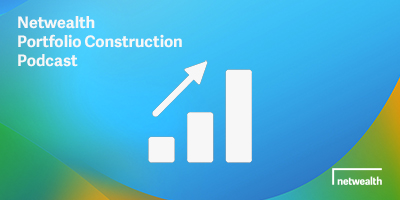Take outs
- Small cap market has larger alpha potential than its large cap counterpart
- Increased volatility ups the risk of negative returns
- Companies adhering to good ESG practices are more sustainable
The Australian market is highly skewed towards large stocks, but it offers a rich and diverse opportunity set for investors who are willing to scope out those hidden, underappreciated companies.
In its latest webinar, ‘Identify small cap stocks that will last the distance’, Netwealth spoke to Michelle Lopez from Aberdeen about the Australian equity market, its potential and downsides.
Michelle explains that the Australian small cap market has greater alpha potential than its large cap counterpart, but overall the market is highly skewed.
Due to its peculiarities, Michelle advises current and future stock investors make sure they have an understanding of the way the market functions.
If we delve closer into the ASX 300 index, which incorporates all of the companies in the top 100 and an additional 200 smaller companies, we find that the top 20 companies actually represent 57 per cent of the index.
On the other hand, the top 20 small cap companies only make up 12 per cent of the ASX Small Ordinaries Index.
By breaking the market down further, we see that 50 per cent of the large caps are the banks and the miners. This, Michelle explains, means that if we remove the top 100 companies, we reduce stock concentration and change the sector exposure.
So, what does this mean for investors?
“The core is that the Australian small cap market provides a much richer and a more diversified opportunity set for investors to scope out those hidden, underappreciated companies,” says Michelle.
But here’s the challenge, she says, this part of the market is much more volatile. With increased volatility comes greater risk of negative returns.
“More than half, or 53 per cent, of all stocks within the ASX small companies index posted negative returns over the last five years and almost a third, 31 per cent, of them halved in value, and this was over a very constructive period,” explains Michelle.
“We've had cheap debt, we've had strong underlying macro drivers and momentum driven markets.”
For some context, she reveals that over this same period, only 20 per cent of the top 100 companies delivered negative returns and only 2 per cent of them lost half their value.
“You can burn a lot of money by taking in small caps and this downside bias is something you should be very mindful of. Avoiding some of the failures is probably just as important as trying to select those ones that are going to double in value,” Michelle advises.
So how do you avoid the companies that will destroy capital and invest in those that will provide the consistent returns?
Michelle believes that success or failure is actually embedded in the fundamentals of the company.
She explains that there are a number of factors to consider when investing. These include ownership structure, the company’s business strategy, financials, management and ESG.
“These are all of great importance when selecting high quality companies and constructing better quality portfolios,” says Michelle.
Starting from ESG–the environmental, social and governance factors–she explains that companies that adhere to good ESG practices are more sustainable and therefore offer a higher degree of future proofing.
Compare managed funds and models
Get the latest research data and commentary to search and compare managed funds and managed account models. See performance data, costs and use powerful filtering tools to identify funds by manager and asset classes.
Why does ESG matter?
ESG factors, says Michelle, are financially material and impact corporate performance.
“I regard ESG as a normal part of investment. To me it really is common sense. Why would someone ignore factors that could have a material impact on the future outcomes of a business?” says Michelle.
“You need to really look at these issues when you're considering the long-term investment factors of each individual company.”
She notes that informed and constructive engagement helps foster better performance and enhances the value of investments.
“Companies that adopt good governance, not only will they build high quality, more sustainable businesses, they will actually be rewarded by the market,” Michelle states.
Other elements to consider
Moving on to ownership structure, she clarifies that transparency is key.
When evaluating a business, make sure you confirm it has a clean company structure, visible earnings and consistent cash flow conversion, Michelle instructs.
Moreover, she explains that when analysing a company’s business strategy, you should be looking for high barriers to entry.
Keep an eye out on the market share that the business has and, more importantly, the trajectory of those shares, Michelle says.
But don’t forget management.
“Experience, execution and track record is very important for a management team. We spend time with all levels of management but predominantly the CEO, CFO, chief technology officer, chief risk officer and then the managers below them. And we meet with them at least every six months to understand the strategy and the milestones being hit,” Michelle clarifies.
The fourth point is the financials. A very strong balance sheet is crucial, she says.
“We look for good margins, a good return on capital, and we've been able to avoid a number of the blow-ups in this part of the market because of the conservative nature of the financials,” Michelle says.
She advises investors to look closely at the off-balance sheet liabilities, exercising robust detailed research and analysis.
“This involves face-to-face meetings with management, but it also involves meetings with competitors, suppliers, customers. How you get your insights really depends on what avenues you take,” Michelle concludes.
Find out more
Listen to the Netwealth webinar, Identify small cap stocks that will last the distance, for more expert insights into making healthy investment decisions.
Learn more about Australian small cap stocks from Michelle Lopez
Insights
Netwealth portfolio construction podcast
We pick the brains of wealth management experts to uncover insights on the investment areas they are most passionate about.
Exercising discipline when building a portfolio
Learn how to form a disciplined process for analysing investments, an essential step when building a successful portfolio.
What you need to know to wind up a SMSF the right way
Understand the changes to SMSFs and what to consider if you're thinking about winding one up.
Build a resilient portfolio for all stages of the economic cycle
Learn strategies to navigate an evolving world by building your portfolio for any economic condition.
The information in this article is general in nature. Any financial advice it contains is general advice only and has been prepared without taking into account the objectives, financial situation or needs of any particular person. The article content is not intended to be a substitute for professional advice, so before you act on it you should determine its appropriateness having regard to your particular objectives, financial situation and needs, and seek any professional advice you require. Any reference to a particular investment is not a recommendation to buy, sell or hold the investment. The relevant disclosure document should be obtained from Netwealth and considered before deciding whether to acquire, dispose of, or to continue to hold, an investment in any Netwealth product.
This webinar guest is a financial product issuer. Netwealth and the guest have a commercial arrangement that enables investment in products managed by the guest through Netwealth’s platform. Under that arrangement, Netwealth may receive fees from the webinar guest. More information about the fees Netwealth receives is provided in our Financial Services Guide, which is available on our website or by contacting us.




